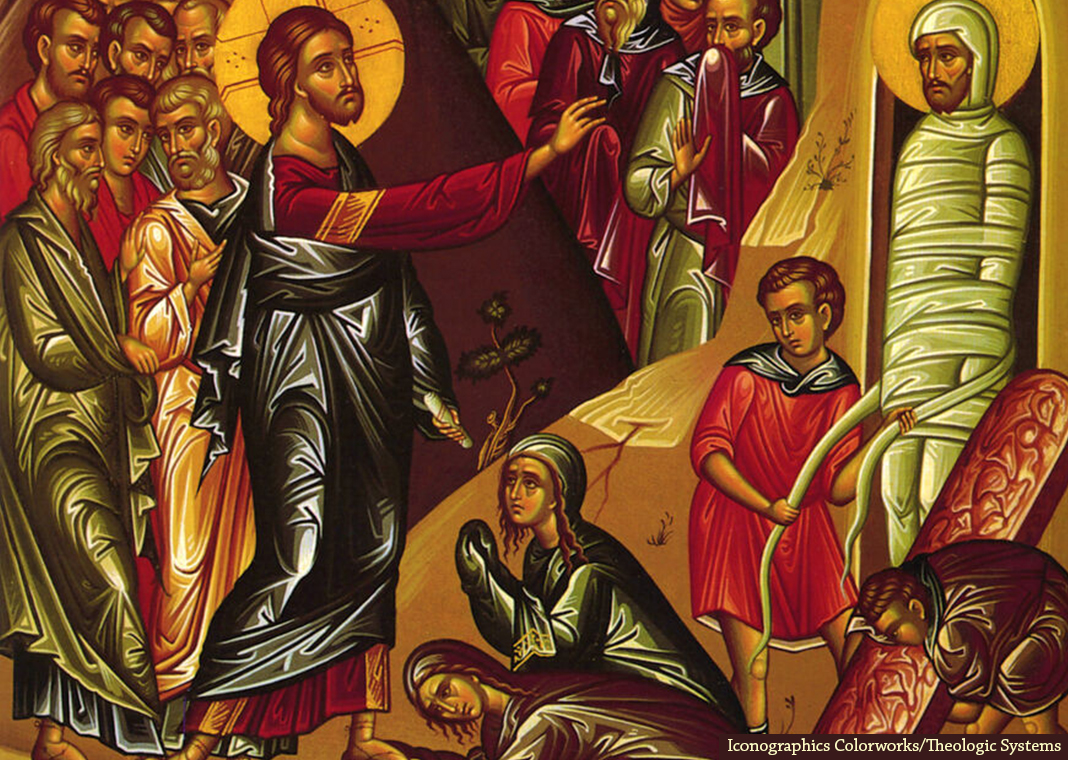
In our Lenten disciples series, we have explored the stories of Jesus and the woman of Samaria (John 4:1–42) and the man who was blind since birth (John 9:1–41). We now turn to the dramatic story of the raising of Lazarus (John 11:1–45).
Set in the small town of Bethany, which was about two miles from Jerusalem, we hear that Lazarus, the brother of Martha and Mary, was very sick. The sisters sent word to Jesus, telling him, “Lord, he whom you love is ill.” (John 11:3) When Jesus heard that his friend Lazarus was ill, he waited two days before setting off for Bethany. By the time Jesus arrived, Lazarus had been dead for four days. When Martha heard that Jesus was coming, she rushed out to meet him and reproached him, saying, “Lord, if you had been here, my brother would not have died.” (John 11:21). But with great faith, Martha said to Jesus, “I know that God will give you whatever you ask of him.” (John 11:22). After a brief dialogue, Jesus asked Martha if she believed in him, he who is the resurrection and source of true life. Martha responded with her whole heart that she believed. Her sister Mary, openly weeping for her brother Lazarus, made the same statement when she met Jesus: “Lord, if you had been here, my brother would not have died.” (John 11:32) However, Mary did not receive a verbal response from Jesus. Instead, “greatly disturbed in spirit and deeply moved,” (John 11:33) Jesus went to the tomb. Martha reminded Jesus that Lazarus had been dead four days and that there was likely to be an odor as a result. Jesus said to her, “Did I not tell you that if you believed, you would see the glory of God?” (John 11:40) After the stone was taken away from in front of the tomb, Jesus called out to Lazarus, who then emerged very much alive.
Let’s explore a few of the major themes about discipleship from this amazing story.
Faith and hope are linked.
The death and raising of Lazarus show that faith and hope are linked. In their anguish and grief, both Martha and Mary scold Jesus for not being present sooner. Jesus responds to Martha’s rebuke by telling her that indeed her brother would rise again from the dead. She replies, “I know that he will rise again in the resurrection on the last day.” (John 11:24) Her faith and hope in this is remarkable, all the more so because it was not widely shared, especially among the Sadducees. As disciples, Jesus expects faith and continued hope from each one of us.
Have confidence in Jesus’ compassion.
Martha and Mary approach Jesus with confidence, and he responds with compassion. Lazarus’s death is deeply troubling for Jesus, even though he has the power to raise Lazarus from the dead. We see how Jesus is disturbed by Lazarus’s death; he even weeps for his friend. Jesus shows compassion to those who are mourning, most especially Martha and Mary. In the face of the despair of death, Martha clings to the hope of the resurrection and confidently states that Jesus Christ is the Messiah. As disciples, we too must have confidence in the power of the Gospel to transform and liberate us from the darkness of despair.
Love opens us to the promise of eternal life.
Love abounds in this story. Jesus’ love for Lazarus, Martha, and Mary is the same love that God our Father has for each one of us. Jesus conquers sin so that we too may share in everlasting life. It is the hope of new life and the resurrection of the dead that we Christians cling to. Jesus has trampled down death on the Cross, and just as he did for Lazarus, he too calls us to come out from whatever tomb we find ourselves in. Love opens the tomb of our hearts to receive Jesus so that we can approach him as his beloved children.





Be the first to comment